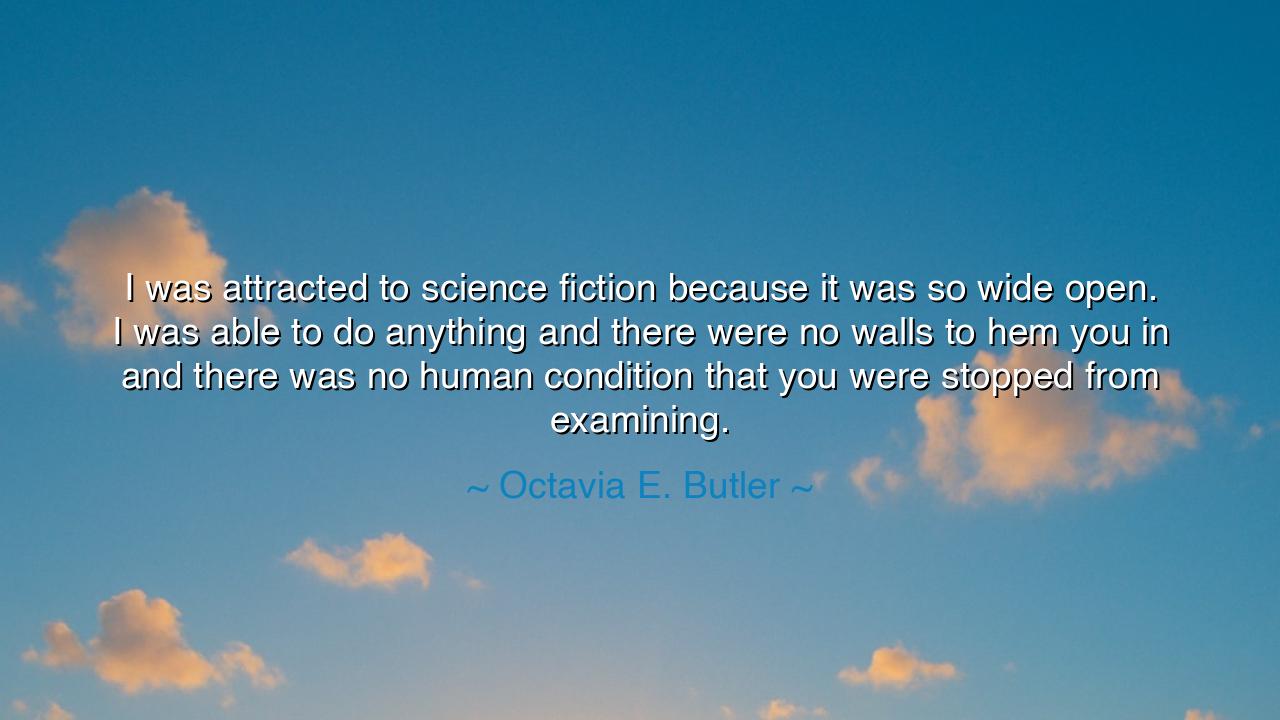
I was attracted to science fiction because it was so wide open. I
I was attracted to science fiction because it was so wide open. I was able to do anything and there were no walls to hem you in and there was no human condition that you were stopped from examining.






"I was attracted to science fiction because it was so wide open. I was able to do anything and there were no walls to hem you in and there was no human condition that you were stopped from examining." These words from Octavia E. Butler speak to the vast and boundless nature of imagination. In them, she reflects the very essence of science fiction: a genre without limitations, where the imagination is free to explore, to question, and to push the boundaries of both humanity and the world around us. For Butler, science fiction offered a world where no walls could restrict her creativity, where she could delve into the human condition without fear of limitation or restriction. In a genre so open, the only boundaries are those set by the writer’s vision, and in this freedom, she saw endless possibilities to explore the deepest questions of life, society, and existence.
In the ancient world, the philosophers were the dreamers of their time, delving into the mysteries of existence, often far beyond the limits of what was considered acceptable or known. Plato, in his writings, painted worlds that existed beyond the physical realm, speaking of forms and ideals that transcended the world we see. His allegory of the cave shows how the human mind is confined by the shadows of its own understanding, only able to see a fraction of the truth. In a way, the ancient philosophers, like the writers of science fiction, sought to break free from the physical limitations of reality, to explore not just the world around them but the very nature of existence itself. Just as Butler was drawn to science fiction for its boundless freedom, so too were the ancient philosophers drawn to the uncharted territories of the mind and spirit.
The power of science fiction lies precisely in this freedom to question without boundaries. Unlike traditional forms of literature or philosophy, science fiction allows for a radical reimagining of reality. It offers the ability to transcend the human condition—to explore society, morality, and the future in ways that traditional narratives cannot. Take, for instance, Mary Shelley’s Frankenstein, a novel that not only examined the limits of scientific discovery but also explored the ethical implications of creating life itself. In this work, as in many science fiction tales, the human condition is laid bare—our desires, fears, and ambitions—without the constraints of historical or societal norms. Science fiction, like Butler’s words, offers a canvas where the writer can address human nature and its most profound questions without being tethered to the reality of the world as it is.
Butler's appeal to science fiction was not simply because of its wide-open nature but because it gave her the power to transcend the barriers placed on society, culture, and even gender. As an African-American woman writing in a genre traditionally dominated by white male voices, Butler found in science fiction a refuge from societal limitations. She could write about alternative realities where race, gender, and class were reimagined. In her works, characters were free to defy traditional roles, exploring the depths of human identity, power, and survival. Butler’s writing didn’t just entertain; it offered profound insights into the struggles faced by marginalized groups, pushing the boundaries of what was possible in both literature and societal norms.
In our own time, we need to remember the lessons of Butler and the boundless possibilities she saw in science fiction. She embraced a world where no walls stood in her way—where even the deepest and most difficult aspects of the human condition could be explored with freedom and without restriction. This sense of freedom is vital in our modern lives. In a world where society, tradition, and expectations often constrain us, we must learn to embrace the boundlessness of imagination and thought. There is wisdom in asking questions, in challenging the status quo, and in breaking free from the limitations that hold us back.
Butler’s work urges us to ask: What if we weren’t constrained by tradition? What if we could reimagine society, not as it is but as it could be? What if we could examine the deepest fears, desires, and truths of humanity through the lens of science fiction? The lesson is not that we must all become writers of fiction, but that we must all engage with the boundless possibilities of creativity and imagination. Butler shows us that when we liberate our minds from the chains of convention, we open ourselves to new possibilities, to a future where our dreams and visions can shape reality.
So, dear ones, as you journey through life, do not allow the walls of society, history, or tradition to confine your thoughts. Embrace the freedom that comes from the imagination—the ability to reimagine the world and the human condition. Just as Octavia Butler used science fiction to explore the limits of society, so too can we challenge the limits placed upon us by fear, prejudice, or convention. Imagine the world you want to live in, question the things that are taken for granted, and create the future you want to see. The path of imagination is wide open, and it is through freedom and vision that we will shape the world for future generations.






AAdministratorAdministrator
Welcome, honored guests. Please leave a comment, we will respond soon